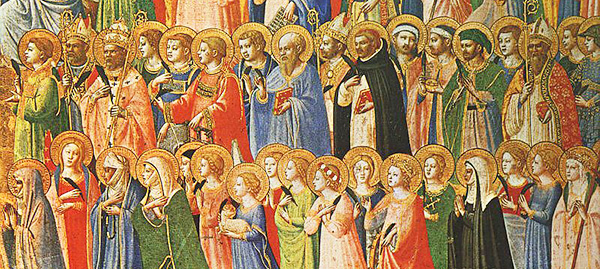
V/ I will turn to you O God,
R/ to God who gives joy to my youth
V/ Give me the Wisdom that sits by your throne;
R/ that I may be counted among your children
Lord, in your all-providential plan, you have led me to this moment to rediscover me in your Word and Wisdom. Aid me to make this time of meditation and prayer enriching, transforming, and liberating for my well-being and others. Amen!
BE PURE AS CHRIST
By Fr Jerome Ituah, OCD
Solemnity of All Saints
Revelations 7:2-4,9-14; Psalm 23; 1 John 3:1-3; Matthew 5:1-21a
1st November 2025
In our first reading, the visionary John saw an angel sealing the foreheads of God’s servants. A hundred and forty-four thousand from the tribes of Israel were sealed, a vision harkening back to Ezekiel, where an angel marked the foreheads of those grieving over abominations, sparing them from death (Eze 9:3-6). This 144,000 represents the saved remnants of Israel.
After the Assyrian conquest, the Northern kingdom’s people were exiled, becoming known as the ‘lost tribes’. However, the prophets unanimously foretold a restoration and reunification of the entire Israelite nation (Jer 31:31; Isa 11:11-13). John’s vision confirms this divine promise. The number itself is symbolic: 12 (tribes) multiplied by 12 (apostles) multiplied by 1,000 (symbolising completeness). John sees the twelve tribes restored under the twelve apostles.
Following this, John sees an enormous, uncountable multitude from every nation, race, tribe, and language. This group represents the Gentiles, dressed in white robes and holding palms. The palms signify the restoration of the Temple (Neh 8:15; 1 Mac 13:51), with the multitude celebrating their acceptance into the everlasting Temple.
The white robes are also symbolic. Those wearing them have endured persecution and ‘washed their robes white… in the blood of the Lamb.’ This may allude to Daniel’s end-time prophecy: ‘Many shall purify themselves and make themselves white and be refined… those who are wise shall understand’ (Dan 12:10). Two elements are clear: purification and refinement. The Psalmist corroborates this: those who seek God’s face have clean hands and a pure heart, and they receive the reward from the God who saves them.
In the Gospel, Jesus’ Beatitudes proclaim a blessing for the pure in heart, for their reward is that they shall see God. Both Israel and the Gentiles who enter the kingdom of heaven are those who have purified themselves.
St. John, in the second reading, reminds us that we are already children of God through Baptism. We are merely awaiting the future when we shall see God as He truly is. He concludes, ‘Everyone who entertains this hope must purify himself, must strive to be as pure as Christ.’
The saints we celebrate today have washed their garments white and purified themselves; they have received their reward. They provide examples for us to emulate. The challenge for us is to continually purify our garments, making an effort to live good and holy lives so that we can join the company of saints in heaven.
This call to holiness is a universal invitation, echoed by Carmelite saints. St. Therese of Lisieux felt this profoundly, viewing her mission as only beginning in death, envisioning she would continue to do good on earth from heaven. She teaches that everyone is called to sainthood. Initially hoping to emulate the great saints, Therese realised God summons each person uniquely. Her vocation became clear: to embody love within the Church by performing small tasks in remarkable ways. This ‘little way’ is her path to sainthood.
By engaging in small, yet extraordinary acts, we are invited to develop purity of heart, shedding selfish and egotistical tendencies. We should avoid holding onto grudges and pain, focusing instead on doing good for all. This captures the essence of being a saint—yearning to be kind to others while striving to love God and keeping Him at the core of our existence.
Daily Offering
Lord God, King of Saints, we thank you for the glorious vision of that great multitude who stand before your throne, their robes washed white in the blood of the Lamb. We thank you for the call to holiness, extended not only to the great tribes and apostles but to each of us in our own time and place. Grant us the grace to purify our hearts, to wash our garments clean of all selfishness, pride, and resentment. Give us the purity of heart to seek your face, so that at the end of our lives, we may be counted worthy to join the company of heaven and see you, our God, as you truly are. Amen.
Questions for reflection:
• In what specific areas of my thoughts, words, or actions do I recognise a need for purification so that I might better reflect Christ’s purity?
• How does Thérèse’s “little way” challenge my own understanding of holiness? Where in my daily ministry and community life can I exchange ambition for this profound, hidden love?
• Which “small” resentments or selfish habits am I currently holding onto, and how can I offer them to God as an act of purification?
Suggested Exercise for the Week:
This week, consciously adopt St. Therese’s “little way.” Identify one or two routine, daily tasks—perhaps administrative work, a domestic chore, or a recurring interaction—that you tend to perform automatically or with impatience. Choose to transform that action. Before you begin, pause and offer it as a deliberate act of love for God and for those it serves. Focus on performing it with complete attention, kindness, and patience, seeing it not as an interruption, but as your primary path to holiness in that moment.
Commit to Heart: When the saints go marching, O Lord, I want to be in the number
